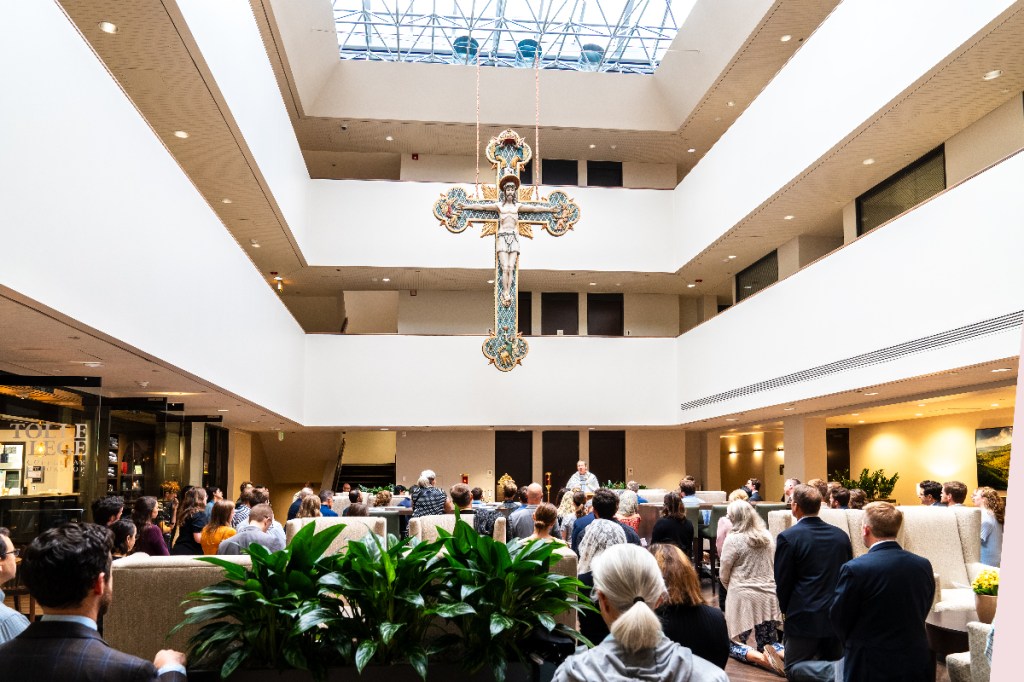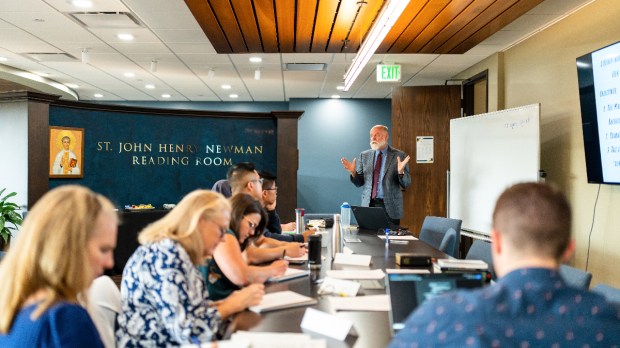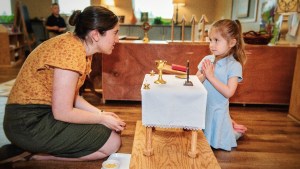Lenten Campaign 2025
This content is free of charge, as are all our articles.
Support us with a donation that is tax-deductible and enable us to continue to reach millions of readers.
Pope Benedict XVI wrote in 2007 of a serious, growing problem in the Catholic Church: the problem of education.
“Educating has never been an easy task and today seems to be becoming ever more difficult,” he said, speaking in dire terms of an “educational emergency” in Catholic schools.
The Augustine Institute offers a much-needed practical solution: a new Master of Arts in Catholic Education program to prepare Catholic school teachers to communicate an integrated theological worldview rooted in Christ.
The Master’s Program in Catholic Education
Pope Benedict’s warning about an “educational emergency” was one of many sources of inspiration for the program.
“Our response to this emergency is to focus on the character and identity of the teacher,” said Christopher Blum, Ph.D., provost of the Augustine Institute.
“Teachers need a formation that roots the task of the Catholic teacher in the truth of God’s love revealed in Jesus Christ.” Such formation is just what the new program provides.
The Master of Arts in Catholic Education is a 36-credit-hour program available to on-campus or distance students at either a full-time or part-time pace. The curriculum is composed of twelve courses, each of three credit hours, including:
- Four courses in theological and biblical foundation
- Four courses treating the liberal arts and Catholic education
- Four classes in classical education or specific teaching areas
The program had a “soft launch” in summer 2023; the first regular class will enter in January 2024.

At its heart, the program puts Jesus at the center of a Catholic school teacher’s vocation. Blum explained,
“The M.A. in Catholic Education at the Augustine Institute is rooted in the knowledge of Jesus Christ, ‘the way, the truth, and the life’ (John 14:6). The program’s foundational courses in Sacred Scripture and Catholic doctrine and mission set the tone for an approach to the art of teaching that is Catholic, classical, and evangelical in the best sense of each of those three words.”
A Renewal of Culture
Jeffrey Lehman, Ph.D., professor of philosophy and theology, directs the new master’s program in Catholic Education. For him, the program is a sign of hope and renewal.
“For all the serious challenges facing the Church and Catholic schools today, we are nonetheless living in a time of great hope,” he said. “The hunger for authentic, devout, well-informed Catholic education is growing rapidly.”
This hunger for excellent and faithful Catholic education creates a great need for Catholic teachers and administrators who can embody this educational renewal, leading students into the fullness and wonder of Catholic education.
“Our program is a place for current and aspiring teachers and administrators to receive the formation they need,” Lehman said.
The program is for all Catholic educators, whether teachers, principals, administrators, coaches, school board members, or anyone else who is engaged in or wishes to support the work of Catholic education. The program offers the formation they need to support and extend educational renewal in Catholic schools.
“As Catholic schools seek to reclaim the riches of the tradition of Catholic liberal education, they are returning to what has made Catholic education excellent through the centuries,” Lehman said.
These strengths include the following:
- Teachers who are disciples of Jesus Christ and embody their discipleship in the way they teach
- Curriculum grounded in the liberal arts, informed by a profound understanding of human nature and the human person, and integrates knowledge in the light of the Catholic faith
- Forming the hearts and minds of students so they may be living witnesses to Christ in their classrooms
Together, these strengths embody the heart of Catholic education. Teachers and administrators who desire these strengths in their schools can find in the Augustine Institute’s new Master of Arts in Catholic Education program the training and formation needed.
Every element of the program is grounded in the Catholic faith. Each seeks to support and inform the work of Catholic educators in fidelity to Jesus Christ and the teachings of the Catholic Church.
“By not only grounding our work in the Church’s educational traditions but also being mindful of the present needs and challenges facing the Church and the world today,” Lehman said, “we offer our graduate students the formation they need to be prepared for the future and to share the hope of the Catholic faith with their students.”
Learn more about the Augustine Institute’s Master of Arts in Catholic Education.



